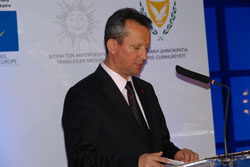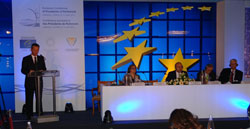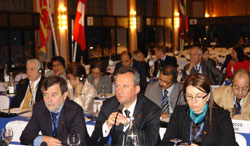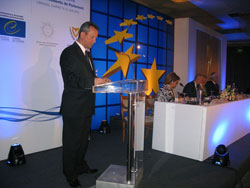Friday, 11 june 2010, Limassol, Cyprus
ADDRESS BY THE PRESIDENT OF THE ASSEMBLY OF THE REPUBLIC OF MACEDONIA, MR. TRAJKO VELJANOSKI ON THE EUROPEAN CONFERENCE OF PRESIDENTS OF PARLIAMENT
 Distinguished Chairman
Distinguished Chairman
Ladies and Gentlemen
Your excellences
When we speak about democracy, we always refer to the relations between the government and the parliament - the cooperation between them, but about the tensions in their relations. Unlike the government, which is more unified by nature, parliament as the legislative body reflects the political, and sometimes the ethnic plurality of every society. The parliament of every state works fully transparently and the public, i.e. the electorate can evaluate the work of both the majority and the work of the opposition.
The presence of the opposition in the parliamentary democracy is essential part of the general human rights. Its presence and acceptance, as a political reality is the basic criteria upon which the state or the society is evaluated as democratic or authoritative.
The position of the opposition parties in a parliamentary democracy is stipulated with the Constitution or law in only 2 European states. On the other hand, the Council of Europe and its institutions - the Parliamentary Assembly and the Venice Commission, have adopted numerous resolutions and other documents which define this issue. Additionally, when we speak about the rights and obligations of the opposition, they are closely connected with the political culture, which is a process that cannot simply be taken from other countries, it must be built.
Ladies and gentlemen,
 You can have a real opposition in parliament, not just a decorative one, only with truly fair and democratic elections. Since independence, in the Republic of Macedonia we have had 6 parliamentary elections, characterized as fair and democratic and as elections which fulfill the European standards. This was clearly listed in the OSCE-ODIHR and the Council of Europe’s Reports. In this manner, the present composition of our Assembly fully reflects the will of the citizens. The Assembly of the Republic of Macedonia, as well as every other democratic parliament, works in accordance with the Rules of Procedure, whose provisions do not favor neither the majority nor the opposition, but secure equality as well the responsibility of every MP for the overall process of adoption of laws and all the other activities of the Assembly of the Republic of Macedonia. That is why I would like to refer to several practical solutions which reflect the position of the opposition in our assembly.
You can have a real opposition in parliament, not just a decorative one, only with truly fair and democratic elections. Since independence, in the Republic of Macedonia we have had 6 parliamentary elections, characterized as fair and democratic and as elections which fulfill the European standards. This was clearly listed in the OSCE-ODIHR and the Council of Europe’s Reports. In this manner, the present composition of our Assembly fully reflects the will of the citizens. The Assembly of the Republic of Macedonia, as well as every other democratic parliament, works in accordance with the Rules of Procedure, whose provisions do not favor neither the majority nor the opposition, but secure equality as well the responsibility of every MP for the overall process of adoption of laws and all the other activities of the Assembly of the Republic of Macedonia. That is why I would like to refer to several practical solutions which reflect the position of the opposition in our assembly.
One of the three Vice-Presidents of the Assembly is elected on a proposal from the opposition and is a member of the oppositional party. Also, representatives from the opposition are chairing several important parliamentary committees such as: the Budget Committee the Standing Inquiry Committee on Protection of the Civil Freedoms and Rights, and the Committee for Supervising the Work of the Security and Counter-Intelligence Directorate and the Intelligence Agency, as well as the National European Integration Council.
An important mechanism which reflects the position of the opposition and its rights are the regular weekly coordinations which are attended by the coordinators of all the political groups and the Vice-Presidents of the Assembly of the Republic of Macedonia. These meetings are chairs by the President of the Assembly of the Republic of Macedonia. On these coordination meetings we agree on, usually by consensus, the dynamics and the agenda of the Plenary Sessions of the Assembly, the manner of work of the parliamentary bodies and the overall work of the Assembly. Also, the Assembly is regularly informed, by the Government Representative who attends these meetings, about the future legislative projects of the Government. In this way, both the majority and the opposition, through their proposals, opinions and remarks, can have an influence on the work of the Government.
 The Law on the Assembly of the Republic of Macedonia, which was recently adopted, is in direction of strengthening parliametarism, which mans strengthening the rights and obligations of all the MPs. This Law strengthens the scrutiny role of the Assembly over the Executive, and according to this Law all the Committees may organize a scrutiny debate on the implementation of a certain law. These debates are attended by MPs, Government representatives, Ministers, deputy ministers, experts and NGO Representatives. I have to underline that at these debate the opposition is very critical of the activities of the Government, but it also demonstrates a very constructive approach.
The Law on the Assembly of the Republic of Macedonia, which was recently adopted, is in direction of strengthening parliametarism, which mans strengthening the rights and obligations of all the MPs. This Law strengthens the scrutiny role of the Assembly over the Executive, and according to this Law all the Committees may organize a scrutiny debate on the implementation of a certain law. These debates are attended by MPs, Government representatives, Ministers, deputy ministers, experts and NGO Representatives. I have to underline that at these debate the opposition is very critical of the activities of the Government, but it also demonstrates a very constructive approach.
Certainly we pay attention to providing funds, facilities and other conditions necessary for the normal work of every MP, whether they are members of the governing or the opposition parties. Also, we have established over 50 parliamentary offices in the constituencies around the country, where assistants of the MPs are employed and facilitate the contact between the MPs and the citizens. Every last Thursday of the month we have a plenary session on which MPs pose questions to the Government, and the members of the opposition have the right to pose twice as many questions as the MPs from the majority.
Ladies and gentlemen
The transparency of the work of every parliament is a condition without which we cannot speak about democracy and in this framework about the rights and obligations of the opposition. In the Assembly of the Republic of Macedonia the overall legislative process is executed electronically, from the arrival of the material, through the submission of amendments until the adoption of the laws. All this is accessible for the public through our web-site. Also, the minutes from the Committee debates, the conclusions, as well as the stenographic notes from the plenary sessions are accessible for the public through our web-site. The second significant mechanism is the Assembly TV Channel which broadcasts all the plenary sessions, the committee debates and the scrutiny debates. I am underlining this because in this manner the position and the opposition can present their opinion, remarks and arguments in a very transparent manner and the public can evaluate the work of the MPs.
Dear colleagues
I would not like you to present before you a virtual and ideal image of the situation in our Parliament. The issue of the relations between the opposition and majority is an issue which cannot be resolved once and for all times, it needs to be upgraded and developed constantly.
 I am personally encouraged by the fact that we have adopted and implemented the fundamental standards of the modern parliamentarism and that we are moving in the right direction regarding the rights and obligations of the opposition. I have to underline the assistance that we have been receiving from the Council of Europe and its bodies, primarily from the Venice Commission. That is why I believe that this Conference will bring new experiences, joint recommendations and further development of parliamentary democracy. In the end I would like to express my gratitude to our host for the excellent organization of this Conference.
I am personally encouraged by the fact that we have adopted and implemented the fundamental standards of the modern parliamentarism and that we are moving in the right direction regarding the rights and obligations of the opposition. I have to underline the assistance that we have been receiving from the Council of Europe and its bodies, primarily from the Venice Commission. That is why I believe that this Conference will bring new experiences, joint recommendations and further development of parliamentary democracy. In the end I would like to express my gratitude to our host for the excellent organization of this Conference.
Thank you.